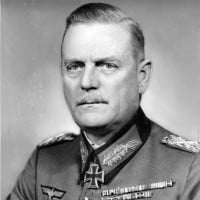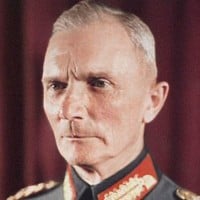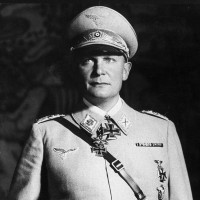Top 10 Best WWII German Field Marshals
Choose your favorite World War II German Field Marshal. Fritz Erich Georg Eduard von Manstein (24 November 1887 – 9 June 1973) was a German commander of the Wehrmacht, Nazi Germany's armed forces during the Second World War. He attained the rank of field marshal.
Fritz Erich Georg Eduard von Manstein (24 November 1887 – 9 June 1973) was a German commander of the Wehrmacht, Nazi Germany's armed forces during the Second World War. He attained the rank of field marshal. Feldmarschall Von Manstein was clearly the best line officer in the German Army. Although Germany did field the best trained army the world has ever seen. Officers, NCOs, and Schutze were cross-trained to such a high degree that when their leaders fell in battle, each could step in and lead. Hitler reduced the size of Panzer and Infantry Divisions by adding more divisions but with fewer brigades and regiments. Therefore, the previously effective force was lost. Von Manstein and his peers fought this change without success. As the war moved forward, officers had to improvise in order to save their troopers.
Allowed to continue as the generals did in 1939 and 1940, the Germans would have crushed the Russians. Had the Germans produced the "Ural" six-engine heavy bomber, then they could have mass-bombed the Russian factories behind the Ural mountains, bombed Britain more effectively, and bombed the U.S. East Coast. Thanks to Hitler, it was cancelled, and the war was lost.
 Erwin Johannes Eugen Rommel, popularly known as the Desert Fox, was a German field marshal of World War II. He worked under Adolf Hitler's Third Reich as a leading general and gained fame from his battles in North Africa.
Erwin Johannes Eugen Rommel, popularly known as the Desert Fox, was a German field marshal of World War II. He worked under Adolf Hitler's Third Reich as a leading general and gained fame from his battles in North Africa. He was a brilliant strategist. Many say that he lost in North Africa eventually, but we must remember the circumstances. He had neither air nor naval superiority, and the allies had lots of compromised intel about his troops and their positions. He was very short on supplies and fought with inferior equipment. Not only did the allies have vastly superior numbers (they had around 3-4 times more), but they also had equipment better suited to desert warfare, which Rommel simply didn't have access to. Yet, many of his battles led to the Germans inflicting much greater losses on the enemy. Truly a great military tactician. If he had the amount of supplies and troops the allies had, he would have been totally untouchable.
Guderian was brilliant and confident. His confidence and courage were his undoing as he frequently opposed Hitler and wasn't shy about voicing his objections. Hitler was unable to take criticism and thus removed Guderian. To me, Guderian was one of the few German Generals who had the courage like Patton and Churchill.
The rest of the Generals were running their show, constantly looking over their shoulder to not offend the High Command. A Top General has his mind on the battlefield and the victory. He isn't making decisions based on what would please the Führer.
Top 5-10. His part in stopping at Dunkirk drags him down. His decision to have the reserves in France further back, against Rommel, is not necessarily a bad one, even if the placement had problems. Overall, he manifested everything good regarding German generals.
Rundstedt was considered the best of the German Field Commanders by both Ike and Monty. Also, according to comments in various post-war publications and interviews with German military officials, Von Rundstedt was the most respected officer in all of the German military, including the Navy and Luftwaffe. That is why Hitler rehired him several times after firing him.
I don't even know why Kesselring is so low on the list. Sure, Manstein succeeded in fighting the Russians, but he only fought one battle, you know. Kesselring fought a million and won most of them. With ease! Brilliant execution of "make yourself invincible before seeking victory against the enemy." He should have been second only to Rommel.
A Luftwaffe field marshal who was also adept at handling his ground troops, he was a cutting-edge strategist for his time. He once said that he thought generals in the future would have to be adept at managing all aspects of combat on land, sea, and air. His steady defense of central and northern Italy has been dubbed "flawless" by several historians.
An absolute master of defensive battles. His part in northern Russia 1941/42 has not been underscored enough. He was also good at Kursk and Arnhem.
Model was an exceptionally good field commander, but he was a brutal field commander. He sometimes took losses that he could not sustain in order to reach his objective. Model was like Heinricci, known as a master of defense. One flaw in his character was that he, when the war was lost, left his troops and committed suicide.
Brilliant in defense, through good intelligence, a continuous frontline, and retreating through prepared defenses. The man knew how to use his tanks to slaughter enemies, in spite of the loss of air supremacy.

"Why did the generals who have been so ready to term me a complaisant and incompetent yes-man fail to secure my removal? Was that all that difficult? No, that wasn't it. The truth was that nobody would have been ready to replace me because each one knew that he would end up just as much a wreck as I." - Keitel
"It is tragic to have to realize that the best I had to give as a soldier, obedience and loyalty, was exploited for purposes which could not be recognized at the time, and that I did not see that there is a limit set even for a soldier's performance to his duty. That is my fate." - Keitel

A Prussian's Prussian, Fedor von Bock performed well in Poland in 1939. He should not have been replaced by von Rundstedt as the commander of the Army Group that would be the deciding force in the Fall Gelb operation in 1940. He was the most aggressive of the three army group commanders, constantly on the move, driving his subordinate commanders forward. He would not have hesitated to wipe out the surrounded Dunkirk enemies. He was also highly aggressive against the Russians and should have been allowed to drive on Moscow. Had Moscow fallen in the fall of 1941, it would have been the greatest catastrophe. Moscow was the greatest political prize. It was the road and railroad center of the country. It also had great industrial value, and the electric grid was centered there too. Gfm. von Bock burned himself out in this campaign. He could possibly have been rated higher than von Manstein had he been allowed to do what he wanted in 1940 and 1941.
 Hermann Wilhelm Göring (12 January 1893 - 15 October 1946) was a German politician, military leader, and leading member of the Nazi Party. He attended the Prussian Cadet Corps to become an officer. In World War I, his success as a fighter pilot was honored with the highest German military order, Pour... read more
Hermann Wilhelm Göring (12 January 1893 - 15 October 1946) was a German politician, military leader, and leading member of the Nazi Party. He attended the Prussian Cadet Corps to become an officer. In World War I, his success as a fighter pilot was honored with the highest German military order, Pour... read more Most dangerous of the German Field Marshals by far, he simply never had the resources necessary to accomplish what was promised by Hitler. He was not for the Barbarossa Plan, but without his Air Force, the German Army wouldn't have penetrated more than a hundred miles into Southern Russia. As it was, they were a thousand miles away before the Army finally outran their air support and then were crushed at Stalingrad for having done so.
Poor in retreat, he had no answer for American airpower since the United States was running much more durable, air-cooled radial engines.
The theory that Germany and Japan "ran out of pilots, not aircraft" is simply false.
By 1945, neither had any of either planes or pilots, giving the soon to be named "United States Air Force" complete air supremacy over ally and enemy both.
Only Göring understood the importance of this.
He was a man who was very familiar with war tactics and defense, so much so that he wrote books about it and was regarded as an authority on defense. And in the use of tactics to wear down the enemy rather than stage a full frontal attack. Hitler's impatience, misguided alterations to field strategy, and armchair tactics to take Leningrad led to his failure to take Leningrad and ultimately cost him the war.
Grossly underrated and one of the most brilliant, if not moral, of the German senior officers.
 Heinrich Himmler was a German dictator, and a leading member of the Nazi party. Himmler was one of the most powerful men in Nazi Germany and one of the people most directly responsible for the Holocaust.
Heinrich Himmler was a German dictator, and a leading member of the Nazi party. Himmler was one of the most powerful men in Nazi Germany and one of the people most directly responsible for the Holocaust. He commanded the SS storm brigades that were responsible for discipline and acted as a special unit.
Did the best he could with limited resources and maximized his potential assets to inflict incredible losses on an opponent with overwhelming resources. Unlike other German generals, he paid strict attention to logistics and intelligence, resulting in superior defensive tactics.
Gen. Heinrici put morals before orders and saved thousands of his men's lives because of his brilliant tactics in a fighting retreat from the Oder river to Berlin. He would have been a Field Marshal but angered Hitler with his religious beliefs. I believe he should be number one on the list.
I'm surprised no one else commented on this guy. While Rommel was the "saviour in the desert," Dietl was the saviour in the snow. Though Narvik fell mostly due to Allied withdrawal, Generaloberst Dietl managed to hold the area around with inferior forces in a difficult position and set up a perfect position to take the city. If it wasn't for him, Narvik might have stayed in Allied hands, and that would have had a significant effect on the war in ways I cannot imagine.
Later, his role on the Finland front was quite great. Despite Operation Silver Fox failing at its goals, he cannot be blamed for the poor troop makeup, frigid temperatures, and it being given second status. Later on, this could have easily become an untenable position that the Soviets could have broken through, but from November 1941 until his death in 1944, he was successful in stabilizing a front in terrible conditions that could have easily collapsed.
Hans von Kluge was born in Poznan, Germany. He was a veteran of WW1, participating in major battles such as the Battle of Verdun in 1916 as a field artillery specialist. He achieved the rank of major general in 1933, then lieutenant general in 1936.
Paulus #19?! People know nothing of WWII German Generals! Hitler, knowing absolutely nothing of war tactics, put his generals in impossible situations every day. Then asked for suicide when his impossible orders couldn't be carried out. Hitler was not a military tactician of any kind. Bohemian Corporal, people, remember that.
Paulus was Catholic and didn't believe in Bohemian Corporal Hitler's suicide ideas. He stated, "He wouldn't kill himself for some Bohemian Corporal who knew nothing of war"! Paulus lived the longest after the war. Who's the brilliant General?
He led Germany after Hitler died, was head of the Navy and Wolfpack, and was an amazing admiral. His skills shown very clear in the Atlantic. Although he isn't the best German general of WWII, he is up there. And definitely should be MUCH higher than what he is now on this list. After all, he was head of the navy.
Against the odds, he fought the naval war as well as Germany could hope for.
This guy tormented the Atlantic for years. Let's get him up higher, guys!
Playing a key role in the Blitzkrieg on the Western Front and even making improvements on Erich von Manstein's original invasion of France, he definitely deserves a spot on this list.
Best all-rounder, most stable, and reliable German field marshal of the war.
A clear-thinking aristocrat, he showed with simple math that the trapped 6th army at Stalingrad could not be sufficiently supplied from the air.
A master of tactical air support. Should be around #4-6 on the list.
Rose from the ranks up to the absolute top by being good at his trade. Perhaps best as a divisional commander, fearless and resolute.
Absolute genius. He defeated an enemy force over ten times his and still virtually annihilated them. His 11th Panzer Division almost destroyed the Soviet Fifth Tank Army in just three weeks. How is that not genius?
Too bad he was never promoted to Field Marshal, or else his name would probably be as high as Guderian and Manstein.
Never heard of this Lieutenant General? He wasn't a Field Marshal, but his brilliance was supreme just the same. He was never part of Hitler's inner circle! Hitler should have just stayed to running the government and left the winless war to his "REAL GENERALS."
He was a Prussian, to the end. His lasting remark addressed to the Nazi judge, at the end of the farcical trial that condemned him to death, was, "You better hurry up and hang me because it won't be long before they hang the lot of you." This depicts the courage of the man. Haggard, abused, and tortured in the Gestapo interrogations, he stood in front of the judge, with no belt to hold up his trousers and no false teeth, forcing him to slur his words. They hanged him with a piano wire around his throat, the wire attached to a meat hook, and slowly raised him to a slow death, filmed for Hitler's entertainment.
Always with his men, and from May 1940 onwards, his LAH fought in every new theatre.
Was in command of the 6th Army. Had he not died, Paulus would not have succeeded him as commander of this Army. The debacle at Stalingrad would not have occurred.
The rare Waffen SS general with moral integrity. He ignored the infamous commissar order. He commanded an international unit of Dutch, Norwegian, and Danish volunteers and placed their welfare ahead of obedience to Hitler's mad orders during his last week in Berlin.
I think Steiner is one of the most underrated generals of the war. He won the defensive Battles of Narva and Tannenberg Line in 1944, outnumbered by between 2 and 6 to one in men, and up to 20 to 1 (or more) in aircraft and armour. His unit also participated in anti-partisan actions in late 1943, which would have been vicious and quite easy to have performed massacres on civilians. And yet, he managed to keep discipline enough during that time (and all others) that the men under his command did not break the rules of law. Other generals subordinate to him, such as Leon Degrelle, speak very highly of him.
The allies tried to charge him for war crimes at Nuremberg, but they could not garner enough evidence (presumably civilians willing to say he was the general in charge of any alleged massacres in their town) to make it viable in court, and the charges were dropped before he even faced trial.
He makes for a true hero of the war, not racist and in charge of many of the non-German SS units from other countries who he treated well no matter where they were from. I believe the reason why most people have never heard about him is despite being a humane, competent general, he was also an ardent Nazi and an unrepentant SS apologist, and after the war spent the rest of his life attempting to rehabilitate the Waffen SS by attending ex-SS conventions and writing his memoirs and books such as "The Volunteers of Waffen-SS: Idea and Sacrifice".
Steiner wanted to show the world that the SS was not full of war criminals who murdered civilians, and as far as he was concerned, the Waffen SS was the most professional military organisation in history who committed the fewest amount of war crimes on any side. Since this doesn't fit with the narrative that all SS members were murderous war criminals who committed more atrocities than anyone else, he is largely ignored and forgotten.